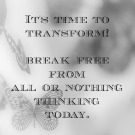Why do things repeatedly trigger us? How often do we chastise ourselves by internally saying things like, “I should be over this already,” “why can’t I let this go,” “why does this keep coming up for me?”
The qualities I dislike in others are disowned parts of my shadow.
Gabrielle Bernstein
Each of us has parts of ourselves that we’ve consciously or unconsciously chosen to disown; we hide these from ourselves because we think they make us weak, unlovable, or bad. But what if there’s true power in embracing, accepting, and working with, instead of against, these parts of ourselves? What if we acknowledged that these parts aren’t necessarily “bad,” but instead offer us hidden gifts that can be integrated into our lives, thereby freeing us from being triggered and continually getting down on ourselves?
Working with our shadow side offers several benefits, including recognizing triggers, revealing areas for healing and growth, and offering us new ways to view ourselves.
Why Shadow Work is Important
Working with parts of our disowned self allows us to focus on what we’re passionate about. This may sound strange, but the things we dislike, such as perceived arrogance or laziness, can point us toward areas that we need to focus on in our own growth. If we dislike arrogance, maybe we have strong beliefs about equality and social justice. Laziness may trigger us because we believe everyone should “do their fair share.” Usually, we have been wronged or slighted by someone arrogant or lazy, and when we perceive these behaviors, we’re triggered.
One of the most important things we can do when we work with our shadow side is to remember that everyone has different sets of expectations. When we place the expectations we have of ourselves on others, we are often doomed to conflict or judgment. These expectations trigger us, and instead of judging a person for that behavior, we can become more aware of ourselves by asking two key questions:
1. Where do I exhibit the same things that are triggering me right now?
2. How could my triggers be seen as gifts?
But, whoa, you say. I’m not arrogant. I’m not lazy. I don’t behave like that. What if you could use parts of those two perceptions – arrogance and laziness – and turn them on their head? If arrogance is linked to “too much” self-confidence and self-worth, would having a little more self-confidence and self-worth help you be more assertive? If laziness is linked to “too much” slacking off and not doing your fair share, could some strategic stepping back and relaxing save you from overwhelm or burnout?
I’m not suggesting you play royalty for a day and expect to be waited on hand and foot while you do nothing. I’m suggesting there might be a way to integrate and embrace those things you’d rather not acknowledge and raise your awareness around why those behaviors might be triggering you.
What Shadow Work Reveals
Working with your shadow side illuminates areas in your life that need to be processed and healed. And processing and healing are rarely linear. This process can be thought of as a dance; you may start out stumbling, and by the end of your life, you may be worthy of bringing home the big disco ball trophy from Dancing with the Stars! Processing and healing can mean anything from journaling or freewriting to working with a therapist. It can also mean expanding your tolerance level by becoming curious about why you’re triggered and then asking yourself where that triggering behavior is present in your life.
As you embrace the parts of yourself you’ve disowned, you may also need to have conversations, first with yourself, and then with others. For instance, if you’re feeling burned out or overwhelmed, start by asking yourself where you need to set a boundary with your own time and energy. Next, have a conversation with others around this boundary. Practice kindness and compassion with yourself and others, but make it clear that something needs to change. Remember that when a trigger arises to start a conversation with yourself first, see if you need to change your perspective, and then determine if you need to have a discussion with others.
Shadow work also shines a bright light on where we need to forgive ourselves. No one is perfect, and in some cases, perfection is one of our shadows; we’d rather not admit we’re a perfectionist, but the need to be perfect has held us back, and we’re ashamed of that. We’ve all done things we’re not proud of, and by accepting those things, learning from them, and growing from those experiences, we permit ourselves to move forward with renewed knowledge and intention.
Getting in touch with where we feel shame or guilt, and owning those parts of ourselves is an example of where forgiveness can set us free. By loving all parts of ourselves, even the parts that might embarrass us, we begin to love the whole authentic person, flaws, and all.
What Shadow Work Allows Us to Do
In addition to increasing our personal awareness, developing a curiosity about how the disowned parts of ourselves can be seen as gifts that allow us to become more non-reactionary. It allows us to witness others in ways that don’t trigger us anymore because we’ve done our own internal work.
When we integrate the parts of ourselves we dislike, we are no longer triggered by them.
One of the gifts of shadow work is that it allows us and others to walk our respective paths. By increasing our tolerance of others in healthy and appropriate ways, we can spend more energy on things we love instead of on reactions and thoughts that drain us.
Shadow work can also increase our self-worth and self-confidence because we have higher self-awareness. This awareness helps us make healthy and life-affirming choices while allowing others to do their own shadow work. Embracing and actually thanking those parts of ourselves that we previously shunned helps us figure out what belongs to us and what belongs to others.
Working with our shadow selves is a lifelong dance that helps calm or let go of our triggers and ultimately love all parts of ourselves. Recognizing and embracing our many facets offers us the opportunity for personal growth and self-forgiveness. You can start the “revealing and healing” process today by asking yourself these questions:
• What are three qualities that you dislike in others?
• How do you display these qualities?
• How can you view these disliked qualities within yourself as gifts?
• What conversation do you need to have with yourself first, and then possibly with others, about ONE of these qualities?
For more information on shadow work, I recommend The Dark Side of the Light Chasers by Debbie Ford (I am not compensated for this recommendation).






